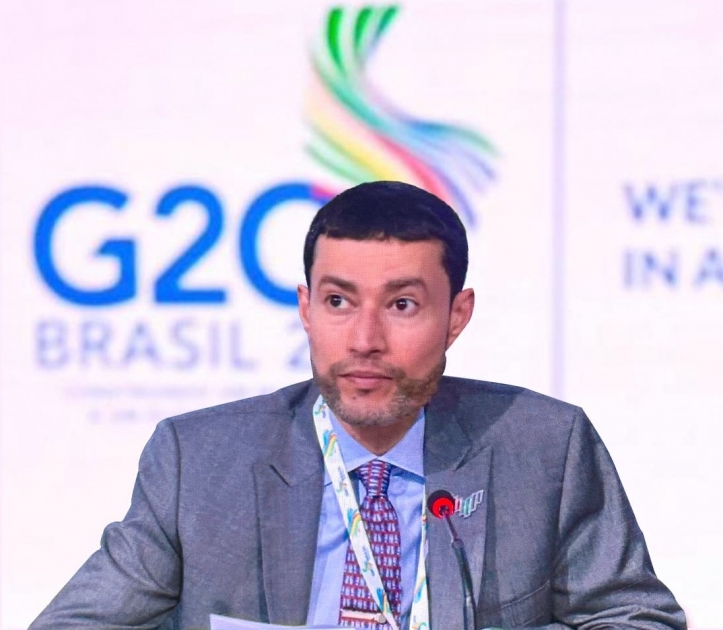
UAE participates in G20 Finance Ministers and Central Bank Governors meeting
The United Arab Emirates, represented by the Ministry of Finance and the Central Bank of the UAE, participated in the first G20 Finance Ministers and Central Bank Governors (FMCBG) meeting under Brazil’s presidency held on 28th and 29th February in São Paulo.
The UAE delegation, headed by Mohamed Hadi Al Hussaini, Minister of State for Financial Affairs, included Ebrahim Al Zaabi, Assistant Governor for Monetary Policy and Financial Stability at the Central Bank of the UAE; Ali Abdullah Sharafi, Assistant Under-Secretary of the International Financial Relationship Sector at the Ministry of Finance; and Thuraiya Hamid Alhashmi, Director of International Financial Relations and Organisations Department at the Ministry of Finance.
Commenting on the meeting, Mohamed Hadi Al Hussaini highlighted the significance of the UAE’s participation in the G20’s activities as it convenes this year’s meetings under the slogan “Building a Just World and a Sustainable Planet”. The focus will be on the priorities set by the Brazilian Presidency – the reduction of hunger, poverty and inequality worldwide, as well as a more equitable governance model and a socio-environmental development that includes a fair and inclusive ecological transition.
On the sidelines of the G20 FMCBG meeting, Al Hussaini held several bilateral meetings with Enoch Godongwana, Minister of Finance of the Republic of South Africa; Christian Lindner, Minister of Finance of the Federal Republic of Germany; and Sergio Díaz-Granados, Executive Presidency of the Development Bank of Latin America and the Caribbean, to explore areas of mutual cooperation.
Mohamed Al Hussaini relayed the UAE Ministry of Finance’s readiness to share its experience in climate financing and sustainable development efforts and initiatives with the Federative Republic of Brazil, which will host the 2025 UN Climate Change Conference (COP30).
He also highlighted the UAE’s interest in strengthening international partnerships as well as economic and financial cooperation, in line with the objectives of the Ministry of Finance Strategic Plan 2023-2026 and the “We the UAE 2031” vision.
Moreover, he noted the UAE’s efforts to face the economic impact of climate change, maintain the flexibility of global supply chains, improve international financial institutions, mitigate global debt vulnerabilities, and effective mobilisation of public and private resources towards a global economy that supports the development of digital infrastructure and works to develop fiscal policy that promotes financial inclusion.
In addition, Al Hussaini pointed out the importance of continuing to invest to accelerate development and growth, and forecasting trends of global trade by developing solutions to critical economic and development challenges, such as tax transparency and Central Bank Digital Currencies (CBDCs).
During the FMCBG meeting, His Excellency highlighted the UAE’s commitment to promoting financial inclusion to reduce inequalities, especially through the launch of the Financial Infrastructure Transformation Programme in 2023, building on the UAE’s regional leadership and long-standing membership in the Global Partnership for Financial Inclusion (GPFI).
Al Hussaini went on to note challenges regarding the medium-term growth prospects, including slower world economic growth and a slowdown in global trade, particularly challenging for developing economies. This motivates the UAE to prioritise multilateral cooperation as it hosts the 13th WTO Ministerial Conference, which aims to reshape the future of global trade.
Al Hussaini reiterated the UAE’s commitment to supporting the Organisation for Economic Co-operation and Development’s (OECD) work on addressing taxation, through the UAE’s implementation of a corporate tax regime in 2023 and the issue of legislation that supports the domestic implementation of the global minimum tax through the OECD Pillar 2 solution.
He emphasised the important role that innovative instruments can play to scale up finance for development, including mechanisms such as green bonds and sukuk. Al Hussaini showcased the UAE’s efforts to support climate resilience in vulnerable countries and advance sustainable finance efforts by pledging US$200 million to the Resilience Sustainability Trust in December 2023.
The G20 FMCBG meeting discussed the progress on the G20 priorities set by the Brazilian Presidency for the year 2024, and agreed on a way forward. The members discussed several key topics, including the role of economic policies in addressing inequalities, global perspectives on growth, jobs, inflation and financial stability, international taxation, global debt, and financing for sustainable development. They also explored the significant global trends and risks impacting global income equality, effective fiscal measures to reduce inequalities, and ways to promote further international cooperation to measure and mitigate inequality.
Furthermore, members exchanged views on the global economic outlook, the social impact of reduced growth prospects, and the opportunities and risks that come with the rapid adoption of artificial intelligence, especially its impact on employment, growth, and inflation. They reviewed potential new initiatives for international tax cooperation, and how to best address inequality through taxation as well as the ongoing BEPS negotiations.
In addition, members discussed the future of the financial sector, digital innovation in the financial sector, and cross-border payments. Also, members exchanged views on development financing and public debt vulnerabilities, how to direct financing flows towards development goals, and innovative instruments that can be employed to scale up development financing resources.
This meeting is the UAE’s fifth participation since the establishment of the Group. The UAE has participated in previous G20 events and summits as a guest country in India in 2023, Indonesia in 2022, Saudi Arabia in 2020, and France in 2011.



























